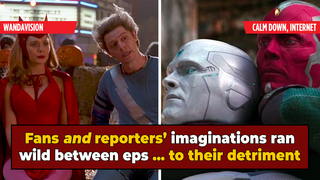'WandaVision's Big Bad Turned Out To Be The Internet

WandaVision began as a broad parody of 1960s sitcoms and ended with a literal witch saying goodbye to her doomed robot husband and imaginary children -- which, you have to admit, is a pretty impressive narrative yoga pose to pull off. But it seems like a lot of fans were looking for something more from the show, expecting that it would introduce the X-Men, or the Fantastic Four, or really any new character to justify Disney's $70 billion Fox acquisition.
And that expectation wasn't completely irrational; for one thing, Marvel has for so long conditioned its audience to see each project less as an individual work and more as a stepping stone to the next movie, teased out in the inevitable post-credit scene. But arguably, the biggest obstacle to people enjoying this show at its face value was that wonder of computer technology you're using right now: the internet.
Don't Miss
Instead of dumping the entire series on the same date like chumps, Disney+ released the show week to week, both appropriately harkening back to the days of network television while also milking those precious subscription bucks for all they're worth. This allowed people's imaginations to run wild in between episodes -- not just the fans but entertainment journalists as well. When Evan Peters' Quicksilver showed up, there were countless pieces about how his casting blew open the doors to the multiverse! We even got an article about how Nicolas Cage's Ghost Rider can now be part of the MCU; as a result, a thing no one has ever once remotely desired. But, as we speculated at the time, it wasn't a universe-shattering attempt to incorporate Fox's X-Men canon into the MCU, but merely a meta sitcom joke -- and one that ultimately teed-up a literal boner gag.


Theorizing about TV shows can be great -- hell, it made Lost watchable -- but so much of the actual reporting surrounding WandaVision continually tried to turn it into something it clearly wasn't. Remember all the reports about Elizabeth Olsen trumpeting a major cameo in the finale? One on par with when Luke Skywalker escaped from a Playstation 2 game and popped by The Mandalorian?

That wasn't a comparison she volunteered; Olsen was asked by an interviewer about The Mandalorian and whether WandaVision had anything "similar in-store," to which she replied: "Yes ... I'm really excited." That was it. Somehow that noncommittal, hazy response was widely reported as evidence that WandaVision's finale would include a shocking cameo. When Paul Bettany was asked about the story, he added fuel to the fire by claiming that the mysterious cameo was an actor he "longed to work with" who he had "chemistry" and "fireworks" with onscreen. So who could it be? Doctor Strange? Ian McKellan as Magneto? Or Dick Van Dyke as himself for some reason? No, in the end, the mysterious actor Paul Bettany was so happy about turned out to be ... Paul Bettany.

Yeah, the internet rumor mill went irrationally insane because Paul Bettany was basically making a dad joke everyone took deadly seriously. And look, we get it, we're also part of the neverending river of madness that is the internet media ecosystem, in which we ceaselessly pore over the granular details of popular movies and TV shows until the day we die. But maybe the ultimate culprit here is the pandemic. Apart from Wonder Woman 1984, pretty much every piece of mainstream blockbuster content, including Marvel's, has been delayed. It's hard to imagine that the internet would have put the same kind of pressure on WandaVision to become a kind of backdoor pilot for the next phase of the MCU if it had been released after Black Widow and The Eternals, as was the original plan. It's as though we all projected our collective backlog of pent-up pop-culture-deprived frustrations onto this one show -- like a desert island mirage, only instead of a cactus turning into a juicy steak, it turned into Magneto.
You (yes, you) should follow JM on Twitter! And check out the podcast Rewatchability.
Top Image: Disney